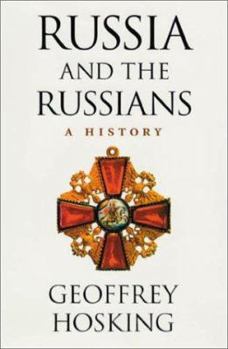Russia and the Russians: A History
Select Format
Select Condition 
Book Overview
From the Carpathians in the west to the Greater Khingan range in the east, a huge, flat expanse dominates the Eurasian continent. Here, over more than a thousand years, the history and destiny of Russia have unfolded. In a sweeping narrative, one of the English-speaking world's leading historians of Russia follows this story from the first emergence of the Slavs in the historical record in the sixth century C.E. to the Russians' persistent appearances...
Format:Hardcover
Language:English
ISBN:0674004736
ISBN13:9780674004733
Release Date:May 2001
Publisher:Belknap Press
Length:718 Pages
Weight:2.65 lbs.
Dimensions:1.8" x 6.7" x 9.5"
Related Subjects
Religious Beliefs And Practices Revolutionary Movements Social Change Europe History RussiaCustomer Reviews
4 ratings
What I came away with.
Published by Thriftbooks.com User , 14 years ago
Above my desk is a large map of the world. A hefty section of this map is Russia. What have I heard and read about Russia? KGB, Russian Mafia, oil, beat Hitler from the East in WW Two, Epic battle at Stalingrad, and oh yes - Stalin. But what do I know about Russians - the people? "Russian and the Russians" is exactly what the title describes. What I came away with is 1) Russia is more than that little slice of Western Russia, i.e., Moscow and St. Petersburg. 2) It's amazing that Russia has been able to hold it together considering the diverse ethnic groups, geography and assorted religious influences. 3) A healthy respect for the Russian people and their love for "their mother earth". A very readable history which I plan to re-read in the future.
Very Good Book
Published by Thriftbooks.com User , 15 years ago
Riveting. Great re-visit on Russian history for the layperson. One point of weakness, the ear of the 1960's when the author himself is in the USSR, the pronoun "I" enters into the book. Can't stand when authors use the first person to describe history. "I" am reading the story and "I" am not a part of this story.
Great One-Volume History of Russia
Published by Thriftbooks.com User , 16 years ago
Hosking's book is a great one-volume look at Russian history. It begins in the first millennium AD. It continues with Russia's struggles with the Mongols and the Ottoman Empire, and it chronicles the nation's efforts to become a great European power. The tsars and the Communist era are both well-documented, and the narrative ends at the year 2000, after almost a decade of Russia's post-Communist transition period. A recurring theme in the book is that the size, vulnerability, and geographic location of Russia all explain why Russians have turned repeatedly to collectivism and authoritarianism, and why Russia has always looked to control the nations near it in order to have a buffer zone between it and other great powers--the ex-Soviet republics that seceded at the end of the Cold War are still referred to as the "near abroad" by some Russians. Hosking believes that Russia will continue to be a formidable power in the decades to come. Many do not agree with him. Other nations in Asia are booming, while Russia continues to have low birth rates and very high (60% - 70%) abortion rates. It is estimated that a sixth of Moscow's population is Muslim, and half the Russian army could be Muslim by 2015. The country also faces social difficulties such as alcoholism and suicide (although the flat tax instituted there has contributed to a big surge in the economy and living standards since 2000). Some have even speculated that an explosively growing China will simply move into and take over the oil-rich territory of eastern Siberia in coming decades. Whether Russia survives in its present form will be one of the most fascinating stories that will unfold on the world stage over the course of the twenty-first century.
An excellent book
Published by Thriftbooks.com User , 19 years ago
This excellent one volume work on the Russians is history at its finest. The reading is easy, digestible and fascinating. Insights into the birth and struggles of the Orthodox Christian church, the 'Third Rome' and the creation of Kieven Rus. The stories of Ivan the Terrible are fascinating and make excellent comparison to his intellectual descendant, Stalin. Stalin and the soviet system are also fascinating subjects. THe author spends a good amount of time discussing RUssia's minorities and this is probably the strongest point in the book. For instance we learn of the rise of nationalism in the Caucuses, central asia, Finland, Ukraine and the Baltic states. We learn also of how Islam is actually a new creation among the Cauceses and in Central Asia, that in fact most of these peoples were not converted to Islam in the 1800s but the rise of Russia, the decline of the Ottomans and the entrance of Sufism actually solidified and normalized Islam in these socieites that had been very tribal with their own distinct customs. The conflict in Chechnya and current RUssia under Yeltson helps make sense of Yeltsins disposal of Gorbachev and then subsequent bombarding of the 'White House'. A must read and a brilliant one volume popular history. Seth J. Frantzman






